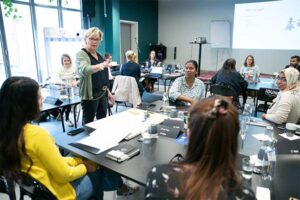This page showcases best practices from the EUGAIN project, as well as successful initiatives from informatics departments, industry, and society, all aimed at enhancing gender balance in informatics across academia and industry.
- Booklet “From School to University” (Deliverable 4)
- Booklet(s) “Future Informatics Students” (Deliverable 5)
- Booklet “From Bachelor/Master Studies to Ph.D” (Deliverable 6)
Each society is constituted by individuals that are unique and diverse from each other. Diversity within any group or society is a winning factor. It implies the presence of different viewpoints and ideas that can significantly empower the group, leading to effective results.
Informatics Europe, in collaboration with the EUGAIN COST Action, organise the Gender Equality in Informatics webinar series, which aims to contribute to sharing best practices as well as relevant research about gender equality and diversity in computer science. The series is a way to strengthen both the understanding as well as the action perspective of this topic.
View more about future and past webinars at: https://www.informatics-europe.org/events/webinars.html.
The IDUN project creates an integrated and binding collaboration between the management and the employees at NTNU, with a focus on gender equality, proposing to create a mentor scheme for women at the master level to associate professor level. IDUN is very closely interlinked with EUGAIN (being both chaired by Letizia Jaccheri).
IDUN builds on the methods used in The Girl Project Ada and WeLead. Two of the success factors in Ada are the focus on recruitment and dropout prevention. IDUN builds upon Ada’s experience to increase the proportion of women among permanent academic staff and in management positions. IDUN’s team works closely with all department heads and HR, and provides support for both the researchers and top management.
IDUN works with The Girl Project Ada to strengthen the focus on gender equality among our international partners, especially in relation to Nordic5Tech – an established collaboration between the five leading technology universities in the Nordic countries. By formalizing and developing existing networks, IDUN contributes to international mentoring schemes between women in scientific positions at different levels. In addition, IDUN strengthens the faculty’s gender equality in externally funded projects, such as Horizon2020, where all funded projects must have a strategy for recruiting women.

Informatics Europe (grant holder of EUGAIN) has collected data for nine years about the educational systems for higher education in Europe, which are available through Informatics Higher Education Data Portal. Partial data about girls participation in studies at bachelor, master and PhD level from seven countries have been presented in a report available here.
The purpose is to show how the data can be used and also to form the basis of more detailed analysis, in order to tackle important issues related to women in Informatics, such as: retain women in academics, studies from “Bachelor to Master, to PhD”, from “PhD to professor”, addressing WP2 and WP3 goals of EUGAIN.
The Minerva Informatics Equality Award recognises best practices in Departments or Faculties of European Universities and Research Labs that encourage and support the careers of women in Informatics research and education.
The steering committee for the Minerva award are the members of the Informatics Europe Working Group Women in Informatics Research and Education (WIRE), which now are part of the COST Action European Network For Gender Balance in Informatics (EUGAIN).
On a three-year cycle, the award focuses each year on a different stage of the career pipeline:
- Developing the careers of female faculty
- Supporting the transition for PhD and postdoctoral researchers into faculty positions
- Encouraging female students to enrol in Computer Science/Informatics programmes and retaining them.
You can learn more about the winners over the history of the award (since 2016) at the Minerva Informatics Equality Award website.